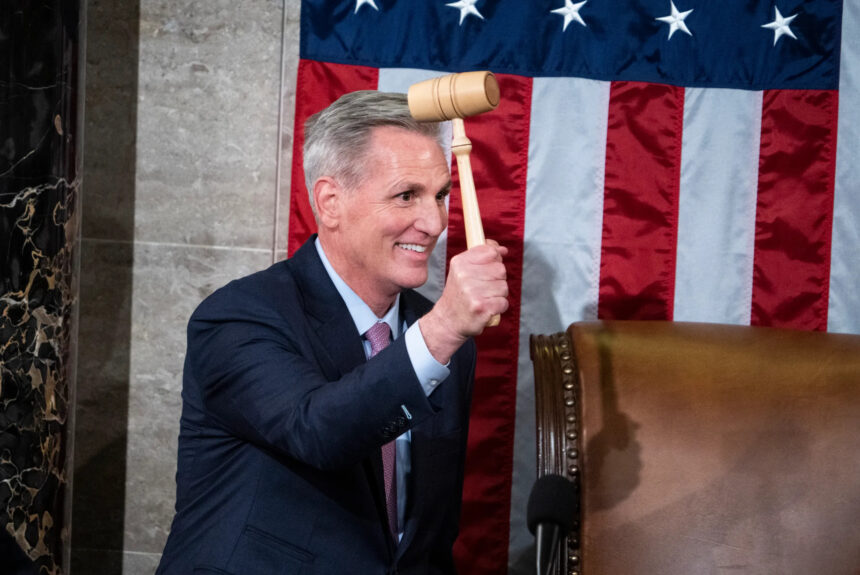The House of Representatives adopted its rules for the 118th Congress this week following a dramatic 15 ballot vote to elect Kevin McCarthy (R-CA) as Speaker of the House. The agreement doesn’t mark a new era as much as an earnest attempt to return to a previous era in which individual members had much greater authority to do their jobs as legislators. The quality of the agreement will be determined by how members steward their recovered powers and responsibilities.
>>>READ: Nancy Mace Outlines a Conservative Climate and Energy Agenda
Observers who derided the 20 holdouts as extremists, hardliners or “far-right” badly missed key historical facts about House rules as well as the important and consequential differences within this group and who came out on top. The clear winners were the “true believer” constitutional conservatives like Representatives Josh Brecheen (R-OK), Michael Cloud (R-TX), Byron Donalds (R-FL), Chip Roy (R-TX) and others. The losers were performance artists and RINOs (Rebels in Name Only) who prefer to spend their time crafting talking points and tweets rather than legislation.
The rule that gives a single House member the opportunity to propose a motion to “vacate the chair” and essentially fire the Speaker through a vote of no confidence has received the most attention, including some wildly inaccurate reporting and commentary. The vacate the chair rule, authored by Thomas Jefferson in 1801, was a fixture of the House of Representatives for more than 200 years until former House Speaker Nancy Pelosi (D-CA) and her Democratic majority did away with it in 2019. Restoring this rule wasn’t extreme; what was extreme was treating this top down, command and control power play by Pelosi and congressional democrats as normal in the long sweep of American history.
The vacate the chair rule has always been an important check on authoritarian power. In 1998, I helped staff Tom Coburn’s effort to use it against former Speaker Newt Gingrich. When Gingrich realized he couldn’t win a vote to vacate the chair after Republicans did poorly in the mid-term elections he resigned. With the benefit of 20-20 hindsight, I would have advised Coburn to persuade Gingrich to offer concessions and continue as Speaker (Denny Hastert replaced Gingrich).
The more important win for House conservatives will be seats on the Rules Committee and the opportunity to ensure that the House returns to a more open, transparent, and democratic process. Returning to “regular order” – the process by which the House of Representatives considers spending bills individually rather than through take-it-or-leave-it omnibus bills – will be good for taxpayers and American democracy.
Rather than marginalizing Speaker McCarthy, the rules for the 118th could end up marginalizing the performance artist caucus. If members complain about the Speaker’s or the caucus’ direction, their colleagues can now rightfully ask: Where are your amendments and bills to make things better?
The rise of performative “infotainment” politics corresponds to the decline of open debate in the House. In the past 15 years, “open rules” – rules passed by the Rules Committee that allow individual members the opportunity to amend legislation (i.e. do their job) have become almost extinct, as this graphic illustrates. Open rules are an important release valve that blows off steam and releases populist anger and resentment. If the body politic can’t express itself through the legislative process it will find less peaceful means of expression. All sides should thank the 20 holdouts for their commitment to representative democracy.
>>>READ: Conservatives Can Win the Long Game on Permitting Reform
But the 20 holdouts shouldn’t over-interpret their mandate and make promises to taxpayers they can’t keep. As admirable as Roy was during these negotiations and during the process to certify the 2020 elections, he made a catastrophic error in 2013 when, as the Chief of Staff to Senator Ted Cruz, he helped orchestrate the “defund Obamacare” gambit which held that Republicans could use a government shutdown to force President Obama to defund his signature achievement. The effort was a short-term and long-term strategic disaster for conservatives that culminated in the collapse of the “repeal and replace” effort in 2017. Instead of coalescing around a replacement plan that could win hearts, minds and votes, conservatives committed ritual suicide on the altar of bad strategy.
Before legislative fights in the House of Representatives begin in earnest, Republicans should review Federalist 65. As Alexander Hamilton warned, “If mankind were to resolve to agree in no institution of government, until every part of it had been adjusted to the most exact standard of perfection, society would soon become a general scene of anarchy, and the world a desert.”
The holdout’s critics would love to see nothing more than anarchy. Conservatives should deny them that pleasure by using deliberation to force compromises that will be more conservative than if no deliberation had occurred. Conservatives can’t deliver perfection and they shouldn’t lie to the base that they can, regardless of how earnestly they stand firm. What they can deliver are smart, tough, and principled fights that will help voters understand precisely what they are for. When those fights happen, the best ideas and policies will prevail. That’s the outcome voters expect and deserve.
The views and opinions expressed are those of the author’s and do not necessarily reflect the official policy or position of C3.
